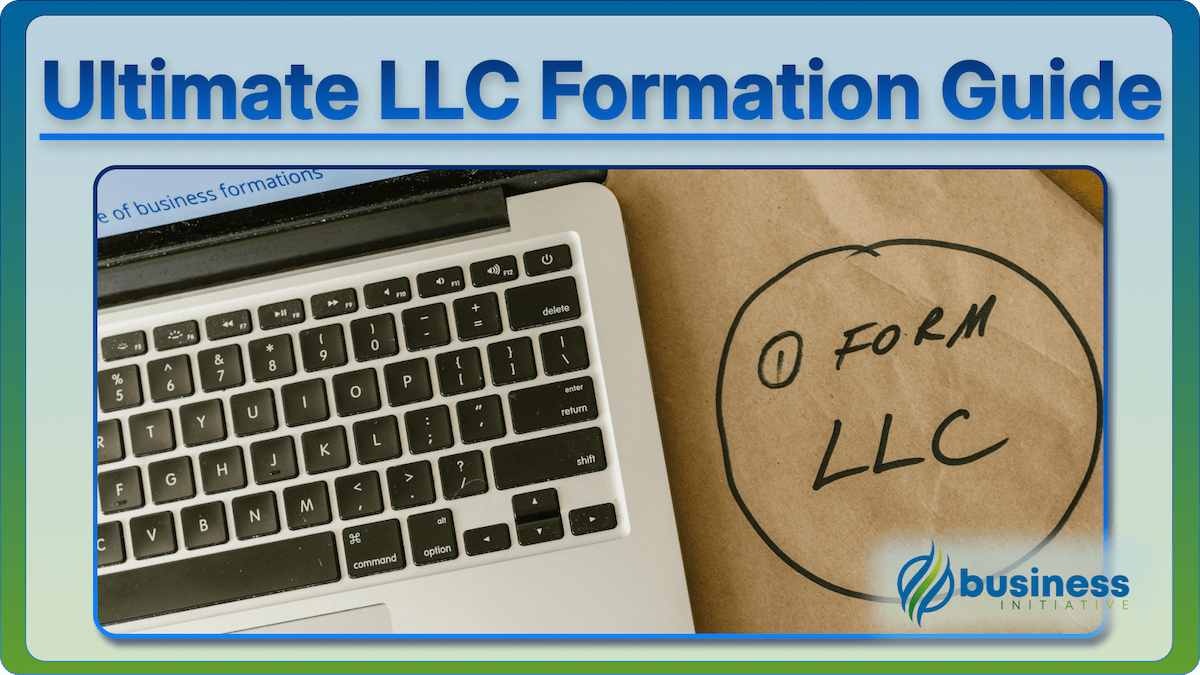You’re starting a business.
You need to choose a structure. LLC? Corporation? Sole Proprietorship?
Everyone tells you something different. Lawyers say one thing. Accountants say another. Online articles contradict each other.
You’re stuck. Paralyzed by choice.
You can’t move forward until you decide. But you don’t know how to decide.
This decision tree fixes that.
Answer 5 simple questions. Get a clear recommendation. Move forward in 10 minutes.
No legal jargon. No accounting complexity. Just straightforward questions that lead to the right answer for your situation.

 Key Takeaways
Key Takeaways
- Most solo founders are best served by an LLC—it offers liability protection without the complexity of a corporation
- Sole proprietorships are only suitable if you have minimal liability risk and don't need asset protection
- Corporations make sense if you plan to raise venture capital, go public, or need multiple classes of stock
- Your choice depends on three factors: liability risk, tax situation, and growth plans
- You can change your structure later, but it's easier and cheaper to choose correctly from the start
 Table of Contents
Table of Contents
Why This Matters
Your business structure affects:
- Liability protection: Are your personal assets at risk?
- Taxes: How much will you pay?
- Growth: Can you raise capital easily?
- Complexity: How much paperwork and maintenance?
Choose wrong, and you pay the price:
- Unnecessary taxes
- Exposed personal assets
- Difficulty raising capital
- Expensive conversions later
Choose right, and you:
- Protect your assets
- Minimize taxes
- Position for growth
- Avoid costly mistakes
This decision tree helps you choose right the first time.

Quick Overview of Each Structure
Before we dive into the decision tree, here’s a quick overview of your three main options:
Sole Proprietorship
What it is: You and your business are the same legal entity. No separate formation required.
Pros:
- Simplest structure
- No formation fees
- Complete control
- Simple taxes
Cons:
- No liability protection (personal assets at risk)
- Hard to raise capital
- Limited growth potential
- Can’t sell the business easily
Best for: Very low-risk businesses with minimal liability exposure.
LLC (Limited Liability Company)
What it is: A separate legal entity that protects your personal assets while offering tax flexibility.
Pros:
- Liability protection
- Tax flexibility (pass-through or corporate taxation)
- Less paperwork than corporations
- Easy to form and maintain
Cons:
- Formation fees
- Some ongoing compliance
- Less attractive to some investors
Best for: Most small businesses and solo founders.
Corporation
What it is: A formal legal entity with shareholders, directors, and officers. Can be C-Corp or S-Corp for tax purposes.
Pros:
- Strong liability protection
- Easy to raise capital
- Can issue stock
- Attractive to investors
Cons:
- More complex and expensive
- More paperwork and compliance
- Double taxation (C-Corp) or restrictions (S-Corp)
- Requires formal governance
Best for: Businesses planning to raise significant capital or go public.
Pro tip: For detailed comparisons, see our LLC vs Corporation guide.

The 5-Question Decision Tree
Answer these 5 questions in order. Each answer leads you to the next question or to a recommendation.
Start here:
Question 1: Do You Need Liability Protection?
Ask yourself: If your business gets sued or can’t pay its debts, do you want your personal assets (home, car, savings) protected?
If YES → Go to Question 2
If NO → Consider Sole Proprietorship
When you might not need liability protection:
- Very low-risk business (writing, consulting with contracts, etc.)
- Minimal business assets
- Strong insurance coverage
- Comfortable with personal asset exposure
Warning: Most businesses benefit from liability protection. Even low-risk businesses can face unexpected lawsuits or debts.
Pro tip: If you’re unsure, choose liability protection. It’s better to have it and not need it than to need it and not have it.
Question 2: What Are Your Growth Plans?
Ask yourself: Do you plan to raise venture capital, go public, or attract institutional investors in the next 2-3 years?
If YES → Go to Question 5
If NO → Go to Question 3
Signs you might need a corporation:
- Planning to raise $1M+ in funding
- Want to go public (IPO)
- Need to attract venture capital firms
- Want to issue different classes of stock
- Planning to sell the company to a larger corporation
If you’re not sure: Most small businesses don’t need a corporation. Start with an LLC and convert later if needed.
Question 3: How Many Owners?
Ask yourself: How many people will own this business?
If 1 owner (just you) → Go to Question 4
If 2+ owners → LLC is likely your best choice
Why multiple owners favor LLC:
- LLCs are designed for multiple owners (members)
- Flexible ownership structure
- Easier to add or remove members
- Less formal governance requirements than corporations
Exception: If you answered YES to Question 2 (planning major growth/funding), you might still want a corporation even with multiple owners.
Question 4: Tax Complexity Tolerance
Ask yourself: How comfortable are you with tax complexity and ongoing compliance?
If you want SIMPLE taxes → LLC (default pass-through taxation)
If you’re comfortable with MORE complexity → Consider S-Corp election or Corporation
LLC tax simplicity:
- Profits and losses pass through to your personal tax return
- No separate business tax return (usually)
- Self-employment taxes on all profits
- Simple and straightforward
S-Corp election (LLC can elect this):
- Can reduce self-employment taxes by splitting salary and distributions
- More complex tax filing
- Requires payroll setup
- Worth it if you have significant profits ($50K+ annually)
Corporation taxes:
- C-Corp: Double taxation (corporate level + shareholder level)
- S-Corp: Pass-through but with restrictions
- More complex compliance
Pro tip: Most solo founders start with LLC default taxation. You can elect S-Corp status later if it makes sense.
Question 5: Future Funding Plans
Ask yourself: Do you need to raise significant capital from investors, venture capital firms, or through stock offerings?
If YES → Corporation (C-Corp) is likely best
If NO → Go back to Question 3
Why corporations for funding:
- Investors prefer corporations
- Easy to issue stock
- Can create different share classes
- Standard structure for venture capital
- Can go public (IPO) if needed
When LLC might still work:
- Raising from friends and family
- Small angel investments
- Don’t need institutional investors
- Can convert to corporation later
Pro tip: If you’re not sure about funding needs, start with LLC. You can convert to a corporation when you’re ready to raise significant capital.
Your Recommendation
Based on your answers, here’s what you should choose:
If you chose Sole Proprietorship:
You said: You don’t need liability protection and want the simplest structure.
Reality check: Make sure you’re comfortable with personal asset exposure. Consider business insurance. Be aware that you can’t easily sell or transfer the business.
When to reconsider: If your business grows, you add employees, or your liability risk increases, form an LLC.
If you chose LLC:
You said: You need liability protection, don’t need major funding immediately, and want tax simplicity.
This is the right choice for: Most solo founders and small businesses.
Next steps:
- Form your LLC in your state
- Get an EIN from the IRS
- Create an operating agreement
- Open a business bank account
- Consider S-Corp election later if profits justify it
Resources:
If you chose Corporation:
You said: You need liability protection, plan to raise significant capital, and are comfortable with complexity.
This is the right choice for: Businesses planning major growth, venture capital, or going public.
Next steps:
- Form your corporation in your state (Delaware is popular for corporations)
- Get an EIN from the IRS
- Create bylaws and corporate records
- Issue stock certificates
- Set up corporate governance (board, officers)
- Decide on C-Corp vs S-Corp tax status
Resources:
Pro tip: If you’re unsure between LLC and Corporation, start with LLC. It’s easier to convert to a corporation later than the reverse.
Next Steps
You’ve made your decision. Now what?
If You Chose Sole Proprietorship:
- Get business insurance to protect against liability
- Keep business and personal finances separate (use separate bank accounts)
- Consider forming an LLC later if your business grows
If You Chose LLC:
- Review our formation guide: Ultimate Guide to Forming an LLC
- Check state requirements: State-by-State Checklist
- Understand the paperwork: Formation Paperwork Guide
- Avoid common mistakes: 21 Most Expensive Formation Mistakes
If You Chose Corporation:
- Review entity comparisons: LLC vs Corporation
- Understand tax options: S-Corp vs C-Corp
- Consider professional help for corporate formation and governance
- Plan your capital structure (types of stock, ownership percentages)
Still Unsure?
Common concerns:
“What if I change my mind later?”
- You can convert LLC to Corporation (or vice versa) later
- It’s easier to start simple (LLC) and convert to complex (Corporation) than the reverse
- Conversions have costs, so choose wisely, but don’t let perfect be the enemy of good
“What if my situation changes?”
- Business structures are flexible
- You can change your structure as your business evolves
- Many successful companies started as LLCs and converted to corporations when needed
“Should I consult a lawyer or accountant?”
- For simple situations (solo founder, straightforward business), you may not need professional help
- For complex situations (multiple owners, significant assets, tax planning), professional advice is valuable
- Use this decision tree first, then consult professionals if needed
Pro tip: Most solo founders with straightforward businesses are best served by an LLC. It offers liability protection without unnecessary complexity. You can always convert to a corporation later if your needs change.
Your Action Plan
This Week:
- Complete this decision tree
- Make your structure choice
- Research your state’s formation requirements
Next Week:
- Begin the formation process
- Gather required information
- Prepare formation documents
This Month:
- Complete your business formation
- Set up business banking
- Create operating agreement or bylaws
- Begin operating your business
Need help with formation? Check out our complete formation guide and our state-by-state resources.
Stay informed about business strategies and tools by following us on X (Twitter) and signing up for The Initiative Newsletter.
FAQs - Frequently Asked Questions About LLC vs. Corporation vs. Sole Proprietorship: A Decision Tree You Can Complete in

How does the 5-question decision tree help me choose between an LLC, corporation, and sole proprietorship?
It walks you through five key questions about liability needs, growth plans, ownership, tax preferences, and funding goals to give you a clear entity recommendation in about 10 minutes.
Learn More...
Question 1 asks if you need liability protection—if no, sole proprietorship is an option; if yes, you move to the next filter.
Question 2 evaluates your growth plans—if you're pursuing venture capital or IPO, it steers you toward a corporation.
Question 3 considers ownership structure—multiple owners generally favor LLCs for their flexibility.
Question 4 assesses your tax complexity tolerance—simple taxes point to LLC default taxation, while comfort with complexity opens S-Corp or corporation options.
Question 5 examines funding needs—significant capital raising from institutional investors requires a corporation structure.
By answering these five questions honestly, the decision tree eliminates most of the confusion and gives you a practical recommendation.
Why is an LLC the best choice for most solo founders and small businesses?
LLCs offer liability protection for personal assets, simple pass-through taxation, flexible management, and lower compliance requirements than corporations.
Learn More...
An LLC creates a legal separation between your personal assets and business liabilities—if your business is sued or can't pay debts, your home, car, and savings are generally protected.
Default LLC taxation is simple: profits and losses pass through to your personal tax return with no separate business tax filing in most cases.
LLCs require less formal governance than corporations—no board of directors, no annual shareholder meetings, no corporate minutes requirements.
You maintain flexibility to add members, adjust profit distributions, and even elect S-Corp tax treatment later if your profits grow enough to justify it.
For the majority of small businesses that don't need to raise venture capital, an LLC provides the ideal balance of protection and simplicity.
When does choosing a corporation over an LLC actually make sense?
A corporation makes sense when you plan to raise venture capital, go public, need multiple classes of stock, or want to attract institutional investors.
Learn More...
Venture capital firms and institutional investors strongly prefer corporations because they can issue preferred stock with specific rights and preferences.
Corporations allow you to create stock option plans to attract and retain top talent—a critical advantage for high-growth startups.
If you're planning an IPO (going public), a corporation structure is essentially required.
Corporations offer the strongest liability protection and carry more professional credibility with certain partners and clients.
However, if none of these apply—if you're self-funded, don't need outside investors, and aren't planning to go public—the added complexity and cost of a corporation is unnecessary overhead.
What are the real risks of operating as a sole proprietorship without liability protection?
Your personal assets—home, car, savings, everything—are directly exposed to business debts, lawsuits, and liabilities with zero legal separation.
Learn More...
A sole proprietorship creates no legal distinction between you and your business. If your business is sued or incurs debt, creditors can go after your personal assets.
Even 'low-risk' businesses face unexpected situations: a client dispute, an accidental data breach, a slip-and-fall at your office, or a vendor contract gone wrong.
You also can't easily sell or transfer a sole proprietorship, and it carries less professional credibility with some clients and partners.
The only situations where sole proprietorship truly makes sense are: testing a business idea temporarily, operating with genuinely minimal risk, and when you plan to form an LLC or corporation very soon.
For most founders, the small cost of forming an LLC is worth the liability protection alone.
Can I change my business structure later if I pick the wrong one initially?
Yes—you can convert an LLC to a corporation or vice versa, but it's easier and cheaper to choose correctly from the start.
Learn More...
Converting from LLC to corporation is a common path for startups that grow into venture capital funding. It involves filing conversion paperwork, restructuring ownership, and potentially triggering tax consequences.
Converting from corporation to LLC is more complex and less common, which is why the decision tree recommends starting with an LLC if you're unsure.
Sole proprietorships can easily form into an LLC at any time with no conversion—you simply file formation documents.
While conversions are possible, they cost time, money, and legal fees. Choosing the right structure from the start avoids these costs entirely.
The practical advice: if in doubt, start with an LLC. It's the easiest structure to upgrade from when your needs change.
How do my tax situation and growth goals together determine which entity to choose?
Your tax complexity tolerance filters between LLC (simple) and corporation/S-Corp (complex), while growth goals filter between LLC (lifestyle business) and corporation (investor-backed).
Learn More...
If you want simple taxes and are building a lifestyle or self-funded business: LLC with default pass-through taxation is your answer.
If you want tax optimization and have significant profits ($50K+ annually): LLC with S-Corp election lets you reduce self-employment taxes by splitting salary and distributions.
If you're seeking venture capital or institutional investment: C-Corporation is the standard, even though it involves double taxation and higher compliance.
If you're seeking modest outside investment from friends, family, or small angels: an LLC can still work, but plan for a possible corporation conversion if you grow into institutional fundraising.
The decision tree uses both factors together—a founder seeking investment but preferring simple taxes would still choose a corporation because the growth goal outweighs the tax preference.
What should I do immediately after deciding on my business structure using this decision tree?
Research your state's formation requirements, gather required information, prepare and file your formation documents, then set up your EIN and business bank account.
Learn More...
Week 1: Research your state's specific requirements—fees, forms, registered agent needs, and processing times.
Week 2: Gather required information (business name, registered agent, member/officer details), prepare your formation documents, and file with your state.
Once approved: Get your EIN from the IRS (free and immediate online), open a business bank account, and create your operating agreement (LLC) or bylaws (corporation).
Set up compliance tracking from day one: annual report deadlines, franchise tax dates, and any other state-mandated filing requirements.
If you chose LLC, consider whether S-Corp election makes sense after your first year of profitable operations.
Sources & Additional Information
This decision tree is based on general business structure principles. Your specific situation may require professional advice from a lawyer or accountant.
For detailed comparisons, see our LLC vs Corporation guide and our S-Corp vs C-Corp guide.
For formation guidance, see our Ultimate Guide to Forming an LLC.
For state-specific requirements, see our State-by-State Checklist.


